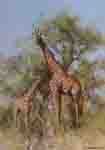Giraffes
David Shepherd
Click on image for details & to ENLARGE
The giraffe's chief distinguishing characteristics are its extremely long neck and legs, its horn-like ossicones, and its distinctive coat patterns.
It is classified under the family Giraffidae, along with its closest extant relative, the okapi. Its scattered range extends from Chad in the north to South Africa in the south, and from Niger in the west to Somalia in the east.
Giraffes usually inhabit savannahs and woodlands. Their food source is leaves, fruits and flowers of woody plants, primarily acacia species, which they browse at heights most other herbivores cannot reach.
Lions, leopards, spotted hyenas and African wild dogs may prey upon giraffes. Giraffes live in herds of related females and their offspring, or bachelor herds of unrelated adult males,
but are gregarious and may gather in large aggregations. Males establish social hierarchies through "necking", which are combat bouts where the neck is used as a weapon.
Dominant males gain mating access to females, which bear the sole responsibility for raising the young.
The giraffe has intrigued various ancient and modern cultures for its peculiar appearance, and has often been featured in paintings, books, and cartoons.
It is classified by the International Union for Conservation of Nature (IUCN) as vulnerable to extinction and has been extirpated from many parts of its former range.
Giraffes are still found in numerous nation
More than 1,600 were kept in zoos in 2010.
The giraffe is one of only two living genera of the family Giraffidae in the order Artiodactyla, the other being the okapi.
The family was once much more extensive, with over 10 fossil genera described.
The elongation of the neck appears to have started early in the giraffe lineage.
Comparisons between giraffes and their ancient relatives suggest vertebrae close to the skull lengthened earlier, followed by lengthening of vertebrae further down.
One early giraffid ancestor was Canthumeryx which has been dated variously to have lived 25–20 million years ago (mya), 17–15 mya or 18–14.3 mya and whose deposits have been found in Libya.
L.S.Lowry
russell flint
Back to David Shepherd prints for sale.


